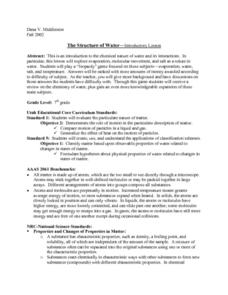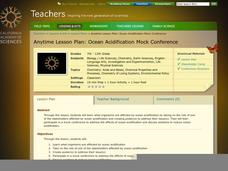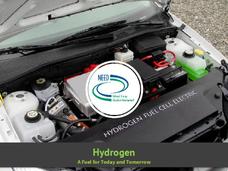Curated OER
Passive Solar Design
Pupils study what passive solar design is for buildings and structures. In this solar design lesson students identify passive solar design techniques.
Curated OER
The Chemical Nature of Water
Seventh graders simulate a Jeopardy game to examine the chemical nature of water. Among the topics featured are evaporation, water, salt, and temperature. finally, as review, 7th graders answer a battery of questions presented by the...
Curated OER
Matter and Energy
Middle schoolers participate in a small group read aloud of the short story, "Cerium" by Primo Levi. They answer several questions about the story and then relate the reading to a lecture on Kinetic theory. After the lecture they apply...
Curated OER
Related to Natural Products
Students examine how the microwave delivers energy at different power levels. They work together to complete experiments on various materials and different power levels. They answer discussion questions to end the lesson plan.
College Board
2001 AP® Environmental Science Free-Response Questions
Water quality testing often reveals interesting facts about the local environment. Scholars respond to several AP® questions highlighting topics such as air pollution, water pollution, and the spread of disease. Each question requires a...
Curated OER
The Sun: Earth's External Heat Engine Part 1 of the Astronomy Model
Students become familiar with the variables that control Earth's solar energy supply. They explore the source and nature of solar energy, the genesis of radiation, and the structrue of the Sun, gas spectra are observed and sample...
Curated OER
Middle School Home Energy Audit
Seventh graders research the origins of local electrical power and compare costs and methods of generation with other areas of the country or world.
Green Learning
Build Your Own Biogas Generator
Where this is not exactly a lesson plan, it is a terrific outline of how to generate biogas from an animal manure sample. If you are up for the challenge, the generator can be built by your class as a concluding project at the end of an...
Texas State Energy Conservation Office
Investigation: Oil Recovery
Energy conservers investigate gravel size to discover if it impacts the amount of oil recovered in the extraction process.
California Academy of Science
Ocean Acidification Mock Conference
In a comprehensive role playing activity, teens play the parts of different stakeholders in the realm of acidic oceans. They research, debate, and create a presentation from the perspective of either ocean organisms, the fishing...
Carnegie Mellon University
International Perspectives to Climate Change 1
After a lecture about how the first industrial revolution triggered the path to climate change, your environmental studies class discusses what the impacts are. In a culminating activity, they get into groups and identify countries on a...
National Energy Education Development Project
Introduction to Hydrogen
Every region has a renewable resource that can be used to make hydrogen. But, what is hydrogen and why can it be used as an energy source? Find out with a presentation that answers these questions and then discusses where hydrogen is...
Re Energy
Build Your Own Biogas Generator
What is biogas and how is it made? After examining background information about the sources of biogas and biogas generators, class members follow the provided information and build a biogas generator that can be used in the...
National Institute of Open Schooling
Chemical Thermodynamics
All chemical reactions require energy. To explore thermodynamics, classes read and discuss its laws, exothermic and endothermic reactions, enthalpy in many forms, calculate enthalpy problems, and use Hess' Law to calculate enthalpy of a...
Curated OER
Cool Chemistry- DIY pH Indicator
Learners study the differences between an acid and a base. In this pH lesson students view a demonstration then test chemicals in groups.
Curated OER
Monument or Energy?
For this national monument worksheet, students will read about the national monument in Utah and the pros and cons about it being a protected area. Students will complete 6 short answer questions based on what they read.
Curated OER
The Carbon Cycle
In this carbon cycle worksheet, learners will read about the carbon cycle and study a diagram showing what creates carbon dioxide and what uses carbon dioxide. Students will then complete 4 short answer questions.
Curated OER
Solar Matters
Students design an energy resource wheel and demonstrate how to use it to access information about renewable and nonrenewable energy sources.
Curated OER
Making New Electricity
Young scholars investigate the concepts of energy conversion and conservation. They research the history of energy conversions into electrical energy. They design experiments in order to replicate a conversion of energy into electricity.
Curated OER
Power In Variety
Students discover different types of energy. In this energy source instructional activity students compare different types of energy, renewable and nonrenewable. Students answer questions about the different types of energy and their...
University of Colorado
Can Photosynthesis Occur at Saturn?
In the 19th activity of 22, learners determine if distance from a light source affects photosynthesis. Participants capture oxygen in straws and find that the amount of water the gas displaces is proportional to the rate of photosynthesis.
NOAA
Exploring Potential Human Impacts
Arctic sea ice reflects 80 percent of sunlight, striking it back into space; with sea ice melting, the world's oceans become warmer, which furthers global warming. These activities explore how humans are impacting ecosystems around the...
Chicago Botanic Garden
Understanding the Greenhouse Effect
Dive into the power of the sun with a two-part lesson. Budding scientists model the greenhouse effect in a hands-on activity, and then participate in a skit that explores the earth's energy balances and what really occurs in the...
Curated OER
Our Earth
In this Earth's environment worksheet, students complete a crossword puzzle given 35 clues about a variety of topics related to our Earth. Topics include ecosystems, precipitation, biomes, energy transfer, soil, weathering and rocks.























